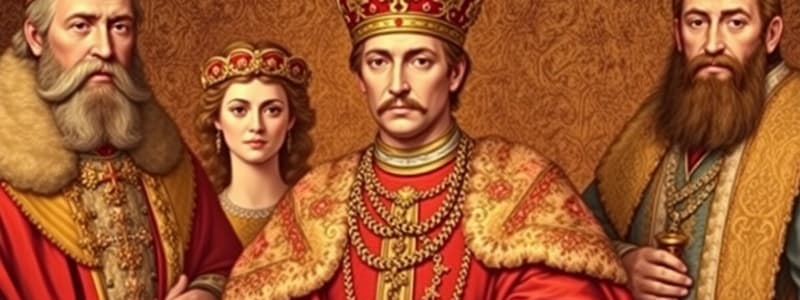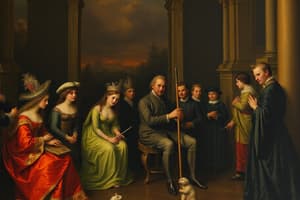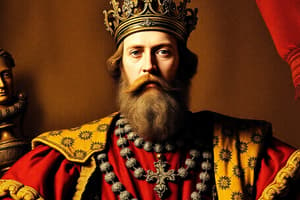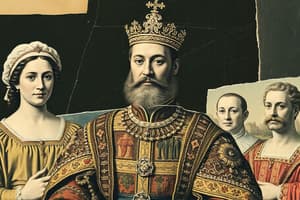Podcast
Questions and Answers
What was a common consequence of the religious policies enacted by absolute monarchs?
What was a common consequence of the religious policies enacted by absolute monarchs?
- Enhanced economic growth in religious regions
- Widespread unrest and conflict (correct)
- Strengthening of diverse cultural practices
- Increased religious freedom for all citizens
How did the courts of absolute monarchs influence culture?
How did the courts of absolute monarchs influence culture?
- They acted as centers for culture, arts, and intellectual discourse. (correct)
- They served as social hubs for the oppressed classes.
- They fostered a decline in artistic expression.
- They became centers of scientific discoveries exclusively.
What major limitation did absolute monarchs face in their governance?
What major limitation did absolute monarchs face in their governance?
- An economic system that consistently benefitted their policies
- Resistance movements and intellectual challenges questioning their authority (correct)
- Total control over all aspects of society without any challenges
- Widespread support from all social classes with no dissent
What was a frequent criticism of the economic policies implemented by absolute monarchs?
What was a frequent criticism of the economic policies implemented by absolute monarchs?
Which statement accurately reflects the impact of absolutism on national identity?
Which statement accurately reflects the impact of absolutism on national identity?
What was a common justification for the rule of absolute monarchs?
What was a common justification for the rule of absolute monarchs?
Which of the following monarchs is considered a quintessential example of an absolute monarch?
Which of the following monarchs is considered a quintessential example of an absolute monarch?
Which characteristic distinguishes absolute monarchs from leaders of more democratic systems?
Which characteristic distinguishes absolute monarchs from leaders of more democratic systems?
What was one of the impacts of absolute monarchs on government structure?
What was one of the impacts of absolute monarchs on government structure?
Which statement about economic control under absolute monarchs is true?
Which statement about economic control under absolute monarchs is true?
How did absolute monarchs justify their rule during times of unrest?
How did absolute monarchs justify their rule during times of unrest?
Which monarch is known for aggressive modernization policies that strengthened their state?
Which monarch is known for aggressive modernization policies that strengthened their state?
What was a challenge faced by King Philip II of Spain that impacted his rule?
What was a challenge faced by King Philip II of Spain that impacted his rule?
Flashcards
Absolute Monarchy
Absolute Monarchy
A type of government where the ruler has absolute control with virtually no limitations.
Divine Right of Kings
Divine Right of Kings
The belief that the monarch's authority is derived directly from God, making them answerable only to divine will.
Justification for Absolute Rule: Order
Justification for Absolute Rule: Order
Maintaining stability and order within a kingdom, often during times of turmoil.
Justification for Absolute Rule: Unity
Justification for Absolute Rule: Unity
Signup and view all the flashcards
Centralized Government
Centralized Government
Signup and view all the flashcards
Economic Control under Absolute Monarchs
Economic Control under Absolute Monarchs
Signup and view all the flashcards
Louis XIV
Louis XIV
Signup and view all the flashcards
Peter the Great
Peter the Great
Signup and view all the flashcards
Cultural Influence of Absolute Monarchs
Cultural Influence of Absolute Monarchs
Signup and view all the flashcards
National Identity under Absolute Rule
National Identity under Absolute Rule
Signup and view all the flashcards
Lack of Representation in Absolute Monarchies
Lack of Representation in Absolute Monarchies
Signup and view all the flashcards
Abuse of Power by Absolute Monarchs
Abuse of Power by Absolute Monarchs
Signup and view all the flashcards
Study Notes
Characteristics of Absolute Monarchs
- Absolute monarchs held supreme authority and power within their realms, with virtually no limitations on their rule.
- Their power was often derived from divine right, the belief that their authority came directly from God.
- They controlled all aspects of government, including the military, judiciary, and economy.
- They frequently disregarded the rights and interests of their subjects. Their actions were not necessarily determined by popular will or the consent of the governed.
Examples of Absolute Monarchs
- Louis XIV of France: Regarded as the quintessential absolute monarch. His court at Versailles was a symbol of his power and grandeur.
- Peter the Great of Russia: Known for his aggressive modernization policies and strengthening of the Russian state. He exerted great control over every facet of Russian life.
- Frederick the Great of Prussia: A renowned military leader and reformer. His absolute rule modernized Prussian society.
- King Philip II of Spain: Ruled a vast empire but faced significant challenges including religious conflicts and economic pressures. His absolutism was challenged by rising nationalism.
- Queen Elizabeth I of England: While not an absolute monarch, she wielded considerable power and faced political pressures during her reign. Her status was at times precarious due to complex political and religious landscapes.
Justifications for Absolute Rule
- Divine Right of Kings: Arguing that their authority was ordained by God, absolute monarchs claimed unquestionable legitimacy.
- Maintaining Order: Absolute rule was sometimes seen as necessary for maintaining social tranquility and stability in times of upheaval and uncertainty. Internal and external threats were often addressed with policies under strong leadership.
- National Unity: Strong centralized rule was often used for consolidating national identities and driving larger agendas.
- National Security: During times of war and external pressure, the centralized decision-making of absolute monarchs could enhance efficiency and effectiveness in defense.
Impact of Absolute Monarchs
- Centralized Government: Absolute monarchs established centralized forms of government, a direct contrast to feudal or decentralized systems.
- Economic Control: Monarchs frequently controlled economic policies to enhance the wealth and power of the state.
- Religious Policies: Many absolute monarchs made decisions that impacted the nation's religious policies, which occasionally caused unrest.
- Cultural Influence: The courts of absolute monarchs often became centers of culture, arts, and intellectual discourse. The policies and choices of absolute monarchs frequently shaped the culture of a nation.
- Development of Strong National Identities: The pursuit of absolutism often led to a more integrated and unified form of national society and identity.
Limitations and Criticisms of Absolute Monarchs
- Lack of Representation: Subjects had little to no voice in their own governance, leading to widespread dissatisfaction and resentment.
- Abuse of Power: Absolute monarchs could and did frequently abuse their power, enriching themselves, oppressing their people, and prioritizing their interests over the welfare of the state. This could lead to revolts and rebellions.
- Challenges to Authority: Resistance movements and intellectual challenges were common, highlighting limitations on absolute power and the growing desire for popular sovereignty.
- Economic Instability: Poor economic policies implemented by absolute monarchs often led to economic hardship and resentment.
- Religious Suppression: Absolute monarchs' policies on religious practice and toleration were a frequent source of conflict and tension. Religious freedom was often absent or significantly restricted.
Studying That Suits You
Use AI to generate personalized quizzes and flashcards to suit your learning preferences.
Description
Explore the defining features of absolute monarchs, who wielded unrestricted authority over their realms, often justified by the divine right of kings. Through historical examples like Louis XIV, Peter the Great, and Frederick the Great, this quiz delves into how these rulers shaped their nations while often ignoring the will of the people.




